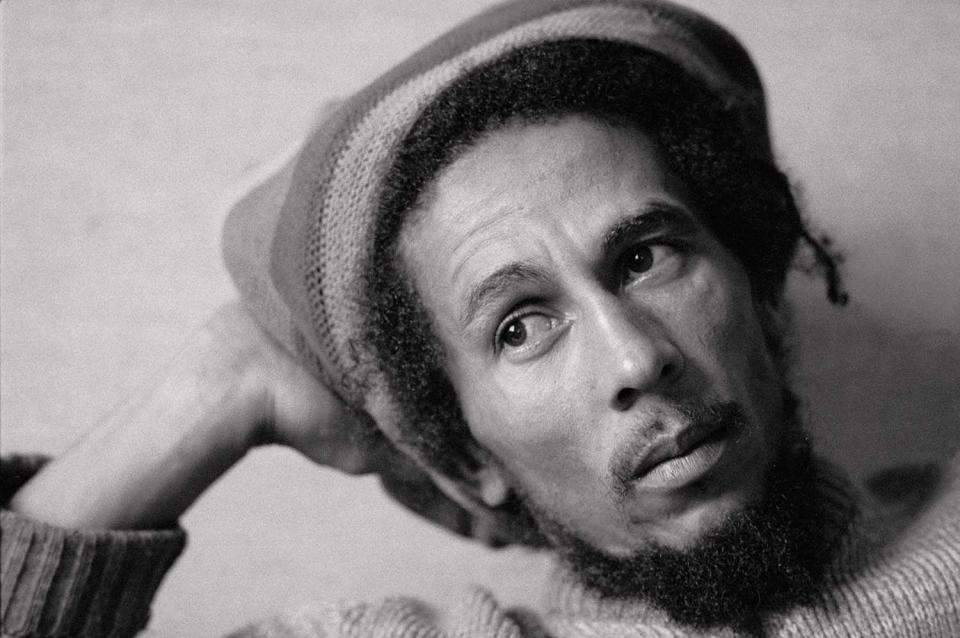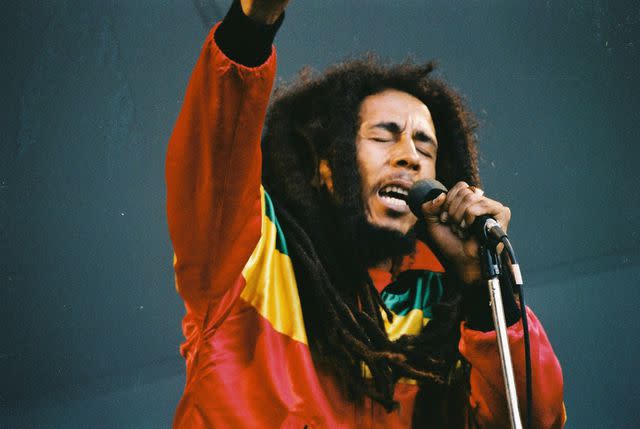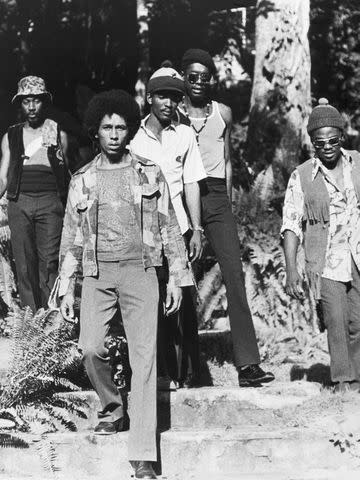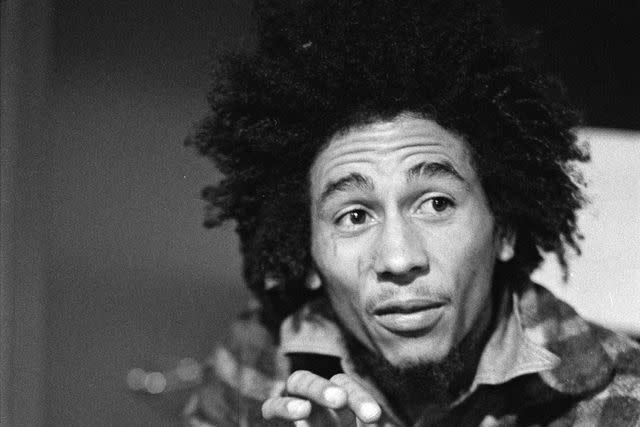Read PEOPLE's Revealing Bob Marley Interview from 1976
- Oops!Something went wrong.Please try again later.
PEOPLE is sharing its April 26, 1976 Bob Marley feature story in light of the box office success of 'Bob Marley: One Love,' in theaters now

Sigfrid Casals/Cover/Getty
Bob MarleyEDITOR'S NOTE: With the new Bob Marley biopic Bob Marley: One Love out now in theaters, revisit PEOPLE's feature story on Marley from the April 26, 1976 issue, written by Lee Wohlfert.
It's not a show, it's a cultural shock wave. Wafting in on gusts of Jamaican ganja (pot), Bob Marley, the man with the corkscrew curls — called dreadlocks — leaps onstage, hangs a portrait of the late Ethiopian Emperor Haile Selassie on an amplifier, shouts a dedication to "Rastafar-I," and breaks into a song of warning: "Lively up yourself, and don't be no drag/ Lively up youself cause reggae is another bag."
So much for the warm-up near the Trenchtown slum in Kingston, Jamaica where Marley and the hypnotically repetitive reggae rhythm got started. So much for the Caucasian cashbox reggae of Harry Nilsson, Paul McCartney, Cher (yet) and Eric Clapton with his 1974 hit version of Marley's "I Shot the Sheriff." Barring a failure to "lively up" U.S. Customs, Bob Marley and the Wailers crash into Philly this week with the authentic thing. Or what's left of it.
The seven-"mon" group begins an 18-city tour and simultaneously releases its latest LP, Rasta Man Vibration. From advance orders, it promises to be reggae's first U.S. gold album. Admittedly, this is a somewhat syrupy export version of the sound brought earlier in purer form by Toots and the Maytals, in the Jimmy Cliff track for the cult film The Harder They Come and, most notably, by Marley himself. The irony is that looming commercial success (he could be worth a million by year-end) may compromise Marley's devotion to his Rastafarian creed. Aside from its endorsement of sacramental "herb" (another Jamaicanism for dope) and its male sexist proclivities, the faith seeks to overturn capitalist privilege.
Related: See the Bob Marley: One Love Cast Side by Side with the Real People

Pete Still/Redferns
Bob Marley on June 7, 1980Marley, now 30, is both star and potential political force in volatile Jamaica, but, his lyric aside, has never shot a sheriff or anyone else. His tunes do bear menacing titles like "Revolution" and "Burning and Looting," but he disclaims charges of rabble-rousing: "We're not talking about burning and looting for material goods and things. We only want to burn capitalistic illusions." But he adds, paraphrasing the words of a new composition: "Until the philosophy wherein one race is superior and one inferior is permanently abandoned and discredited...there is war."
That egalitarian philosophy derives not from reading Marx but from Marley's own personal experience growing up poor and half-white in a white-ruled colony. He only saw his father, a British army captain, "one time or two," he recalls. "I find me mother work for t'irty shillings a week," he says, lapsing into Jamaican patois. "On dis, she had to send me to school, buy me shoes and lunches. Me wonder what a-gwan on."
Never miss a story — sign up for PEOPLE's free daily newsletter to stay up-to-date on the best of what PEOPLE has to offer, from celebrity news to compelling human interest stories.
Influenced by late-'50s stateside rock he caught on his transistor, Bob found music more stimulating than his trade school classes in welding. Along with two pals, he began the five-point-harmony group that was to be called first the Rudeboys and later the Wailers. But in the then-emerging and exploitive Jamaican record business, Marley's authorship of o fewer than six smash hits in Jamaica netted him all of $200. "Nobody never got satisfaction," recalls Marley, who at one point left in disgust for a nine-month stay in Wilmington, Del. where he worked on the assembly line for Chrysler. No solution. "I decided I'd rather be a farmer in Jamaica than work for the system in America," he says.

Michael Ochs Archives/Getty
Bob Marley (second from left) with his band the Wailers, circa 1972. L-R Earl Lindo, Carlton Barrett, Peter Tosh, Aston Family Man BarrettAlong the way, Marley met up with his current lady, Rita, also moving up as a singer. Today, she serves both as a member of Bob's backup trio, the I-Threes, and the mother of at least one of his children. "Me have plenty of kids, not just from Rita, though," says Marley proudly. The authorized count is seven. Early on, when Bob exiled himself to the States, a music impresario gave Rita the already magic surname of Marley, but she's not likely to get it in marriage. Bob is unconvinced by the institution. "Married people are chained," he says. "You can't live by strenuous rules other people make. Check out people who are married—weird."
The climactic point in Marley's life and career was his conversion in 1967 to his exotic and then much-abhorred sect — a peculiarly Caribbean blending of mysticism and back-to-Africa sentiments. According to Marley, Selassie — or Jah (as Rastas call him) — appeared personally in a vision which brought Bob around. Later Marley, despite the disapproval of his devoutly Christian mother, began to let his hair grow into serpentine dreadlocks in obedience to the Bible, which forbids males from touching scissors or comb to hair.

Michael Putland/Getty
Bob Marley on May 31, 1973Today Marley travels not with groupies but his Rasta retinue, including a well-stocked "herbsman." He straddles celebrity with Rasta ascetism, living communal style in the Waiters' Kingston compound, a large, ramshackle English colonial manse, plus a house out back being converted into a sound studio. Assorted Wailers, local musicians and Rasta brethren wander freely through the house, puffing on enormous cone-shaped "spliffs" stuffed with Jamaican cannabis.
The house is closer to the Governor's Mansion than it is to Marley's old Trenchtown stomping grounds, but Marley sees no sellout there. "People got to spread out a little," he says. So too he explains away such conspicuous symbols of consumption as the $15,000 silver BMW he recently acquired. "BMW? That stands for Bob Marley and the Wailers," he figures. "It seemed like the car we are supposed to have."
For more People news, make sure to sign up for our newsletter!
Read the original article on People.

